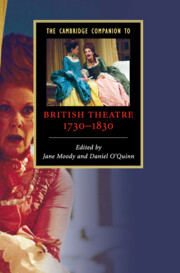Book contents
- Frontmatter
- Part I Performance
- 1 Acting and actors from Garrick to Kean
- 2 Dictating to the empire: performance and theatrical geography in eighteenth-century Britain
- 3 Scenography and technology
- 4 Spectatorship
- Part II Genres
- Part III Identities
- Part IV Places of Performance
- Part V Further Reading
- Bibliography
- Index
- Series list
1 - Acting and actors from Garrick to Kean
from Part I - Performance
Published online by Cambridge University Press: 28 May 2009
- Frontmatter
- Part I Performance
- 1 Acting and actors from Garrick to Kean
- 2 Dictating to the empire: performance and theatrical geography in eighteenth-century Britain
- 3 Scenography and technology
- 4 Spectatorship
- Part II Genres
- Part III Identities
- Part IV Places of Performance
- Part V Further Reading
- Bibliography
- Index
- Series list
Summary
Garrick flourished during the years when educated Englishmen (and a few privileged English women) were admiring their own enlightenment at the same time as they debated issues of 'proper' public conduct. He both encouraged and benefited from a new, quasi-philosophical interest in actors as exemplars of controlled behaviour. Some measure of self-admiration is essential to any actor's wellbeing, and Garrick, despite his constant fear of ridicule, had plenty of it; a current of concern with how he 'looks' runs through his voluminous correspondence. His career marks a transition from an insistently aural theatre, represented by the sonorous James Quin (1693-1766), to a primarily visual one.
The demand for looking-glasses boomed during the final decades of the eighteenth century, indicative both of an increase in self-awareness and of 'the new prominence of beauty as a social and political category'. The idea of the spectator as detached observer and connoisseur, boosted by Addison and Steele's launching of The Spectator in 1711, was not swept away, but it was subjected to pressure by the contradictory cult of sensibility. Laurence Sterne's sentimental traveller carries with him everywhere 'the interest . . . which men of a certain turn of mind take . . . in their own sensations'. A Sentimental Journey was the publishing highlight of 1768, and not all its readers were alert to the wicked innocence of its irony. Hugh Kelly's False Delicacy, puffed into popularity that same year at Drury Lane by Garrick's publicity machine, imported 'sentiment', in the form of exaggerated altruism, to the theatre without a hint of irony.
- Type
- Chapter
- Information
- Publisher: Cambridge University PressPrint publication year: 2007
- 1
- Cited by

